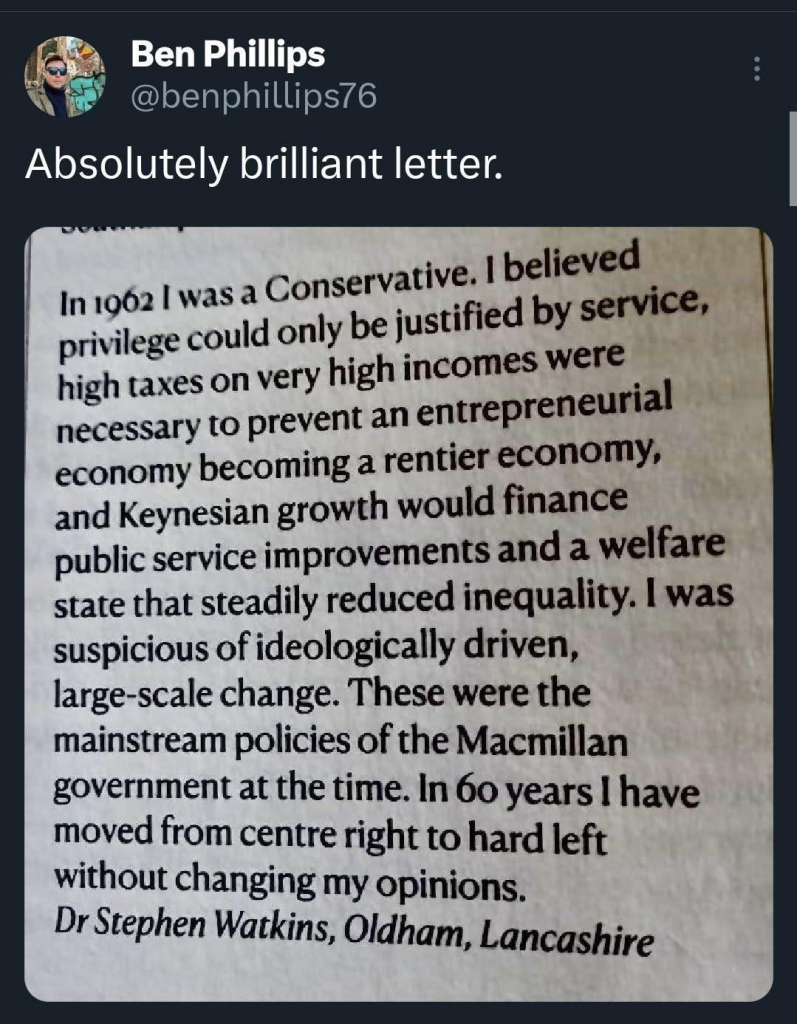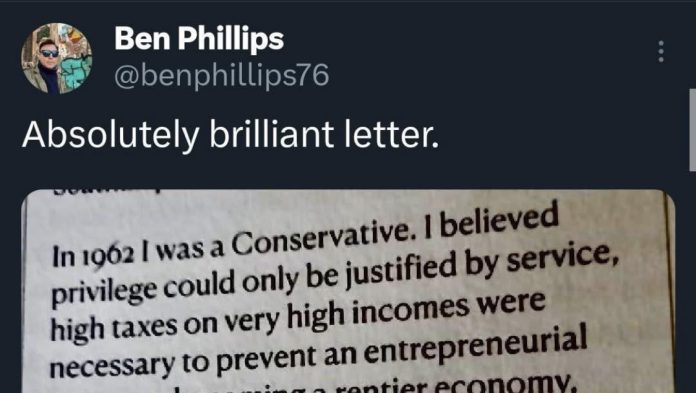The following letter reflects how our grandparents experienced the world and also how we are now having to experience it.
It also explains how the politics of Jeremy Corbyn would have been normal sixty years ago but are now considered extreme.

From the Centre to Hard Left: The Dramatic Shift in Political Perceptions
In the 1960s, political debates in Western democracies revolved around a spectrum that placed moderate conservatives and traditional liberals at its centre. Policies that were then considered centre-right—such as government-funded healthcare, strong trade unions, progressive taxation, and regulated capitalism—were broadly accepted across the mainstream political landscape. However, by the 2020s, many of these positions have been rebranded as radical leftist ideas, highlighting a dramatic shift in political perceptions and discourse.
The Social Democratic Consensus of the 1960s
During the post-war consensus, particularly in the United Kingdom and much of Western Europe, there was a broad acceptance of Keynesian economics. This meant that even conservative parties supported a strong welfare state, nationalised industries, and high taxation on the wealthy to fund public services. The UK’s Conservative Prime Minister Harold Macmillan famously described those who opposed the welfare state as being “too reactionary”. Even the staunchly right-wing Margaret Thatcher was a cabinet minister in the 1970s under Edward Heath, whose government introduced measures such as rent controls and increased social spending.
Similarly, in the United States, Republican President Dwight D. Eisenhower supported a top tax rate of over 90% and invested heavily in infrastructure, including the interstate highway system. The notion that a government had a role in managing the economy and ensuring a basic standard of living was not seen as leftist but as pragmatic governance.
The Neoliberal Shift of the Late 20th Century
The transformation of political ideology began in earnest during the 1980s with the rise of neoliberalism under leaders like Ronald Reagan in the US and Margaret Thatcher in the UK. The emphasis shifted towards deregulation, privatisation, and tax cuts, particularly for the wealthy. The belief in a strong state providing social services was increasingly challenged by the idea that free markets should determine economic and social outcomes.
This shift moved the centre of political discourse significantly to the right. Policies once deemed moderate, such as state ownership of key industries and strong labour protections, were increasingly framed as left-wing, or even socialist, ideas. The Labour Party under Tony Blair in the 1990s abandoned many of its traditional socialist policies in favour of a market-friendly “Third Way”, acknowledging that the Overton Window, the range of acceptable political discourse, had shifted dramatically.
The 21st-Century Rebranding of Centre-Right Policies as Radical Left
By the 2020s, political perceptions had shifted so dramatically that ideas once associated with mainstream conservative politics in the mid-20th century were now framed as radical leftist positions. Policies such as universal healthcare, free university education, strong trade unions, and higher taxation on the wealthy were increasingly portrayed as extreme left-wing demands, despite having been bipartisan or even centre-right positions in previous decades.
For example, the idea of a nationalised railway system, which was standard practice in Britain for most of the 20th century, is now often dismissed as a far-left proposal. Similarly, calls for a living wage and stronger workers’ rights are framed by some as socialist overreach, despite being championed by figures from both sides of the political spectrum in the past.
In the United States, proposals such as Medicare for All or stronger financial regulation are labelled as radical socialism, despite their resemblance to policies endorsed by centre-right figures of the past, including Eisenhower and Nixon.
The Role of Media and Political Polarisation
A key driver of this shift has been the role of media in shaping political narratives. With the rise of corporate-owned news networks and partisan journalism, political discourse has become more polarised, making previously mainstream policies appear extreme. The framing of economic interventionism as “big government overreach” and social welfare as “unsustainable socialism” has further pushed moderate positions towards the political fringes.
Additionally, political funding and lobbying have played a significant role. Corporate interests and wealthy donors have influenced policy discussions, promoting market-driven solutions over government intervention. This has made traditional centre-right economic policies—such as progressive taxation or strong labour laws—less palatable to contemporary conservative parties.
The Future of Political Perception
As political polarisation continues to deepen, the question remains: will the pendulum swing back? The economic crises of the 21st century, including the 2008 financial crash and the COVID-19 pandemic, have reignited discussions about state intervention and wealth redistribution. Younger generations appear more open to policies resembling those of the mid-20th century, which could suggest that the current perception of left and right is not fixed.
Ultimately, the shift in political perceptions over the last six decades demonstrates how relative political labels can be. What was once considered centre-right is now often dismissed as radical left, not because the policies themselves have changed, but because the political landscape has moved significantly to the right. The question for the future is whether this shift will persist or whether the next political realignment will see these ideas regain their mainstream status.







